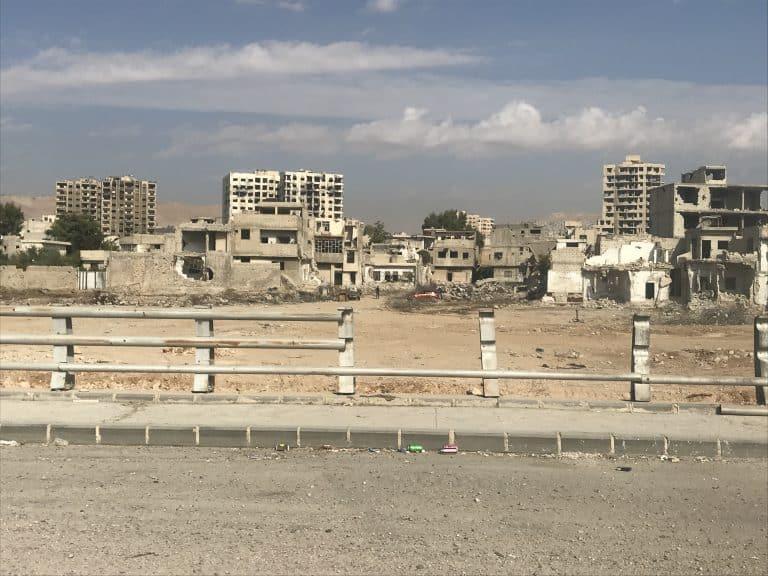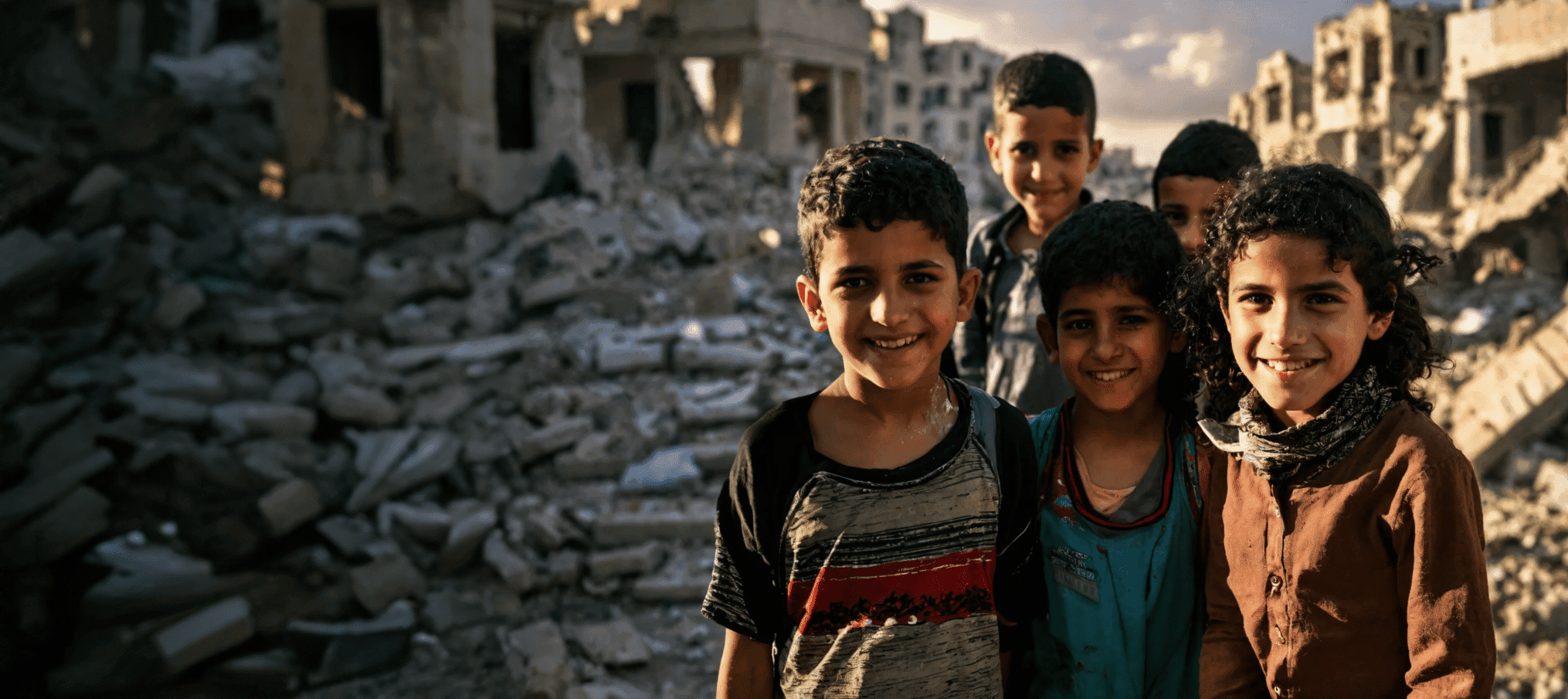Francesco Spagnolli is an assistant country coordinator at the headquarters of Pro Terra Sancta in Damascus . He tells us about his experience in Syria. He arrived in the Syrian capital on May 19 to follow the projects of the Association.
We interviewed him to tell us about the reality in which he immersed himself this first month, a month in which, in his words, many things have already happened!
Francis, tell us about the first impact you had as soon as you arrived in Syria
When I arrived in Damascus I immediately found myself in a completely different reality than that of Aleppo, where I had already been. Damascus is a huge city with seven million inhabitants and is very extensive. For this year I will live in the neighborhood of al-Salihiyah, where the convent of the Franciscans is located. It is a very beautiful area of Damascus, it is the richest in the capital and the Parliament resides there. But like the whole country it is a bit "scruffy" because of the war. The streets are dusty, the houses are not maintained, there is a flood of people, small markets with traders who come there either by car or on horseback. The context is Middle Eastern. Very interesting. I immediately got to know the reality of the Latin Church in Damascus: here there are 4 parishes and five friars. The parishes are located in Salihiyah, Bab Touma, St. Paul, one in the old city. I immediately met all the colleagues in the Pro Terra Sancta office and the international community.
So you immediately immersed yourself in the reality of Pro Terra Sancta in Damascus
Certainly. The reality of Pro Terra Sancta and the Latin Churches. During the first staff meetings hop met many people who revolve around the projects. For example, here with us there is an engineer who follows the project of St. Ananias related to the purchase of houses around the church. These houses are purchased and renovated with the aim of enhancing the area around the church. Then an educational center or a parish center can be born and any Guesthouse for pilgrims interested in learning about the life of the Catholic community of Damascus. So yes, the first few weeks were an immersion in the everyday life of Damascus and Pro Terra Sancta.
How is it handling the severe lack of electricity?
This is the area where the government resides, so the electricity problem is felt less for obvious reasons. But lately there are days when the hours of electricity are never more than five. I am seeing that in Syria the problem of electricity is really urgent and I add that this is also combined with the lack of gasoline. Moreover, the Covid-19 pandemic has caused a steady "downturn" of the economy over the past two years to which is added the wheat crisis caused by the war in Ukraine.
Tell us about Pro Terra Sancta's projects in Damascus
The largest project we have is certainly the one related to the assistance to needy families. It provides for the distribution of food parcels and vouchers to 500 families every week. There are agreements with the various supermarkets and each family has a voucher of different color according to the family unit and the need. It is a fundamental support for families who rely on our help in order to survive.
Alongside emergency projects there is also health care. Pro Terra Sancta finances the purchase of medicines that are in short supply here and that in any case are definitely too expensive for most families. In addition, the Association also supports the costs for the treatment of serious diseases and important operations. Here in Damascus, in fact, we help about twenty people who need continuous assistance and who must be kept under constant medical supervision.
Have you personally met some people we help?
Yes! A few days ago I met a family made up of mom, dad and three daughters. This family has been receiving our support since 2018, when a daughter discovered she had a brain tumor. It is an ugly and difficult disease. The father does temporary jobs and Pro Terra Sancta offers support with vouchers for food (which I mentioned before) and through the financing of medicines.
Another family I met consists of mom, dad and son born with a serious malformation. He has failed to develop and does not know how to express himself. Needs 24-hour assistance. Parents have to stay all day with him to take care of him. We have also given them help so that they can devote time to their child.
It is clear that Pro Terra Sancta helps the family unit
Exactly. Pro Terra Sancta works for the family. There is so much need and wages are so low that in the end a young person does not leave the house until he has economic stability and then makes available everything he has for the good of the family. So if you help a dad or mom you know you're relieving the weight of the whole family.
For Syrians, how important is life around the parish?
Here it is central. The Church has been one of the actors that has most endured the crisis from a moral and economic point of view. He offered support to Christian communities and beyond. The parishes are one of the few places where children aged 5 and over find a space to have fun, play, do activities together in the oratories. The alternative is the road. The Church certainly does a fundamental job. Here in Damascus, the oratories of the Franciscans and Salesians are celebrating.
And not only for children and teenagers, but also parents and grandparents! Everyone in these spaces finds a meeting place where they can "disconnect" a little after a busy day of work and to be in company.
In this first month in Damascus, what do you think is the greatest need of Syrians?
Surely the essential goods that allow you to have a normal life: food, electricity, gasoline, gas. Many work to be able to afford only one gas cylinder. But they cannot devote themselves to anything else. Then it is important to have economic and political stability that makes young people think of a future here in Syria. And unfortunately many young people see neither career nor development in this country. If the fixed thought is only to get to the end of the month it is difficult to look further. And in fact, unfortunately, many are leaving Syria.
Pro Terra Sancta in Syria also takes care of important educational and entrepreneurial projects, right?
Yes! For example, in Maalula and in the parish of St. Paul we have two kindergartens. In the latter there are more than 400 children followed by the sisters. Now that summer is just around the corner, the various summer camps run by the parishes will open their doors to many children and young people and there will be many games (such as football), songs to learn all together, lots of music and lots of fun.
The entrepreneurial side is also very important. In Damascus, Pro Terra Sancta finances the best ideas from local start-ups. Once the winning start-up has been identified through a selection process, the economic and training support starts to kick off the project proposed by the start-up. They are small projects, but fundamental for Syrians. One of them is that of Ghadeer, who in Damascus was able to launch his cutting and sewing start-up that helps many other women.
Personally, how are you living this experience?
Personally it is a beautiful experience. Damascus is a wonderful city and the Syrian culture is truly incredible. And despite the strong difficulties due to poverty and war, it is wonderful to see many realities (even in addition to Pro Terra Sancta) that want to bring concrete aid and true hope here in Syria.












